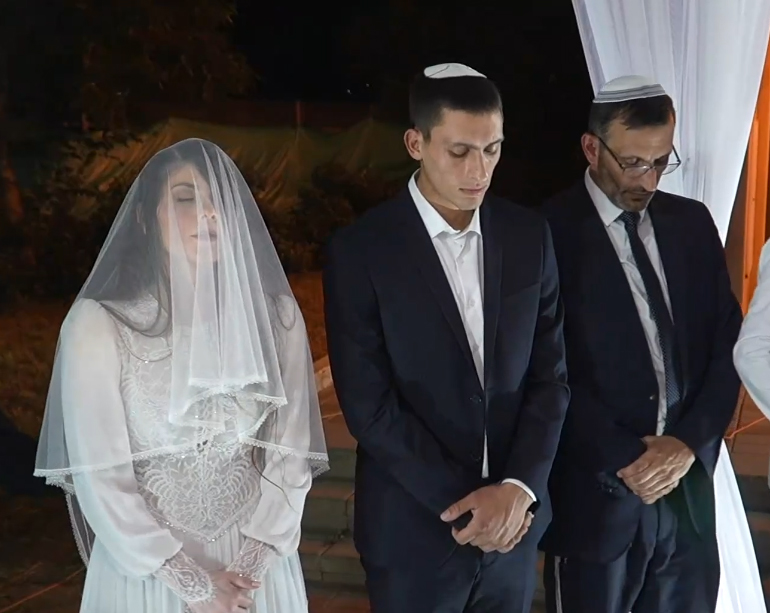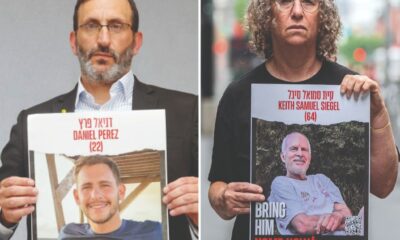
Banner

No hostage deal without soldiers, says Perez
The head of World Mizrachi, South African-born Rabbi Doron Perez, whose son is believed held hostage in Gaza, is imploring top decisionmakers to ensure that no hostage deal takes place without the inclusion of soldiers.
His son, Daniel, 22, who grew up in Johannesburg and attended Yeshiva College before making aliya 10 years ago, is a tank commander in the Israel Defense Forces (IDF). He was stationed at the Nahal Oz army base, close to Gaza, when it’s believed he was taken hostage by Hamas terrorists who savagely invaded Israel on 7 October. Unbeknown to Daniel at the time, his older brother, Yonatan, 24, also a soldier, was shot and sustained moderate injuries during intense fighting nearby.
The family received heart shattering news several weeks later that Daniel, too, had been injured during the attack as blood samples were found in the vicinity of where he was last seen. The extent of his injuries isn’t known.
“The knowledge that Daniel was taken hostage, that he was injured, and the lack of any sign of life or where he may be is incredibly harrowing,” said Perez in a recent address to the Yeshiva Mizrachi community.
It has been 124 days of torment since the family last heard from Daniel. Perez has become a beacon of resilience and steadfast faith for countless families of hostages and those who have lost loved ones in the war. Encouraging many to hold onto hope in this time of profound doubt and uncertainty, he’s now more than ever focussing his activism on efforts to release all hostages, including the soldiers.
“There cannot be any more differentiation between civilians and soldiers. Soldiers are civilians. Our sons put their bodies on the line, and did everything they could to protect,” he said.
“We know Hamas wants to leave the soldiers to the end – if at all – and our job as people and as parents should ensure that in any deal going forward, soldiers need to be part of it. Because if left to the end, we don’t know when that end will be,” he said.
“Our biggest fear is that soldiers are seen as the extension of the state, the price of doing war.”
For this reason, he and many others meet regularly with all leading decision makers. “We need to be supported in this, and ensure that the United States supports us until the last hostage has been returned. This is my focus,” Perez said.
It’s been four months since the Hamas terror onslaught that killed about 1 200 Israelis and took another 253 people hostage.
This week it was reported that at least 32 hostages held in Gaza, nearly a quarter of the estimated 136 remaining hostages held captive in the Hamas-run enclave, are dead. In addition to these, the IDF is assessing “unconfirmed intelligence” that at least 20 additional hostages may have also been killed, according to a New York Times story quoting four military officials who spoke on condition of anonymity.
This news came amid ongoing efforts by negotiating parties to secure the release of the remaining hostages and a new temporary truce in the fighting in Gaza, a war in which Israel has vowed to eliminate Hamas.
It has been a “never ending seesaw of emotions” for the families of hostages as negotiators swing back and forth. Though negotiating parties have said that they are optimistic about a deal coming to fruition, they have cautioned that there’s still a way to go.
In spite of this, Perez, whose entire family is heavily involved in one way or another in war efforts, remains hopeful. “We have hope. Many do not,” he told the SA Jewish Report.
“The real hero in our family is my wife. On so many levels, there’s that deep experiential intuitive connection of a mother. While I don’t want to undermine what I’m going through, for all of us it’s harrowing, but for a mother it’s unimaginable.”
One of the most difficult moments for Perez was when he received boxes of Daniel’s personal belongings from the army including things like his glasses, Tefillin, and clothes.
“I haven’t been able to go through it, it’s been one of the hardest things for me,” he said.
Daniel’s siblings stumbled upon his journal among his possessions, and urged their father to peruse it, knowing it would provide comfort and unveil a new aspect of their brother.
“I was really gobsmacked,” said Perez. “On the first page, he wrote about the things he thinks about before he goes to sleep, first amongst which was the privilege of being an Israeli soldier.
“He spoke about a school trip he had made to Auschwitz, where he saw the horrific price paid for not having the ability to defend ourselves, and how he now had the privilege of being a soldier and an officer in the Israeli army to look after the national home and the family.”
He wrote about being the best role model he could be for the soldiers under his command; how best to lead, motivate, and inspire; and whether his soldiers were ready for war.
The writing presented a different side of Daniel, whom Perez described as a “high octane, adrenalin seeking” energetic, and sporty person who loved serving his country and community.
While the negotiations continue, Perez continues to clutch onto hope.
“I believe that we human beings are much stronger than we think we are. I know the strength is coming from Hashem, and it’s coming from all the love and support. We’re going through an historic stage in our redemption, with so much pain. Somehow, blood and challenge seem to be part and parcel of Jewish life and Jewish redemption. Although this is incredibly painful for our family and so many other families, the fact that we’re going through this together and not alone is redeeming.”











Lee Den Heyer
February 8, 2024 at 5:54 pm
A magnificently written piece of love, strength, courage, resilience and hope.